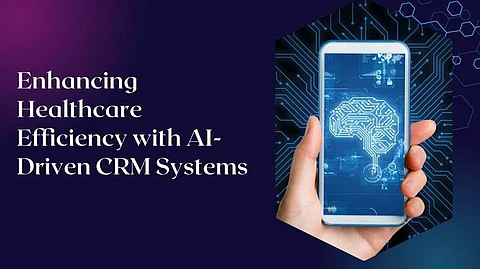

Artificial Intelligence (AI) is not only transforming industries but is also revolutionizing healthcare. In his detailed research, Jaymin Harishkumar Sutarwala demonstrates how AI-enhanced Customer Relationship Management (CRM) systems are reshaping patient interactions, streamlining workflows, and improving overall efficiency in healthcare settings. These systems seamlessly integrate cutting-edge technology with human expertise to deliver holistic patient care. This article unpacks the key innovations from his work and examines how they are revolutionizing patient care.
Dynamic personalization will be one of the most vital developments made possible in AI-enabled CRM systems to patient application. By assessing vast amounts of healthcare data, AI algorithms can adapt their communication strategies to warrant a well-timed and relevant sharing of information to patients. They classify patients behaviorally, demographically, and clinically within a few steps, yielding outstandingly accurate results to predict patient needs. This personalization effort has raised much higher patient satisfaction and adherence to treatment.
Today's sophisticated CRM systems in the healthcare industry run on a multi-layered infrastructure able to handle significant volumes of data. AI brings real-time synchronization of different healthcare information systems with electronic health records, patient portals, and telehealth platforms, thereby enabling easy exchange of information that should allow healthcare providers to make informed decisions reducing the time taken for diagnosis and improving the accuracy of treatment recommendations. Furthermore, such automation would lessen the likelihood of errors and eliminate redundant processes, thereby greatly streamlining administrative processes in organizations.
One of the most groundbreaking innovations in AI-CRM integration is predictive analytics. These systems analyze patient history, behavioral patterns, and clinical indicators to forecast potential health risks. By leveraging machine learning algorithms, healthcare providers can identify patients at risk of hospital readmissions, medication non-adherence, or disease progression. This proactive approach not only improves patient outcomes but also helps healthcare organizations optimize resource allocation and reduce costs. Additionally, real-time monitoring ensures that healthcare professionals are alerted to emerging health concerns, allowing for timely interventions that can prevent complications.
AI-based CRM technologies are aiding in changing how patients engage in smart communication tools. Chatbots equipped with NLP and automated messaging services provide immediate responses to appointment scheduling. Besides treating patients to reminders about health issues that would increase adherence, chatbots also provide tailored health reminders. Such natural language processing linkages guarantee that interactions are not just correct but also contextually suitable. The deployment of these tools has resulted in much higher response rates and reduced missed appointments. These tools, on the other hand, analyze patient sentiment, communication preference, and context to ensure that every engagement remains personalized so as to enhance the provider-patient bond.
In a world that changes so fast by digital transformation, security and compliance become a major concern. AI-enhanced CRM systems use hard encryption methods with biometric authentication, along with the deployment of real-time threat detection mechanisms, to protect sensitive patient data. These ensure compliance with healthcare regulations while preventing unauthorized access to systems. With automatic system updates, AI security protocols keep collecting intelligence from new emerging threats, adapting an instantaneous change as a defense against future potential city attacks that could put vulnerable health information at risk.
Leveraging distributed computing and in-memory processing, AI-powered CRM systems deliver real-time insights that empower healthcare professionals to monitor patient progress and make swift, data-driven interventions. Real-time analytics also facilitate better coordination among healthcare teams, ensuring a more cohesive and effective approach to patient care. As healthcare organizations continue to embrace digital transformation, the role of real-time data processing will expand, enabling predictive and prescriptive analytics that further improve clinical decision-making.
Despite their promise, AI-driven CRM systems must overcome challenges such as maintaining high data quality, ensuring model interpretability, and integrating with existing legacy systems. Addressing these challenges will require ongoing improvements in AI transparency and supportive regulatory frameworks. The future of AI in healthcare CRM is expected to witness further developments in multimodal AI, combining textual, imaging, and sensor data for comprehensive patient assessments. Additionally, advancements in explainable AI (XAI) will provide healthcare professionals with deeper insights into AI-driven recommendations, increasing trust and adoption of these technologies.
In conclusion, AI-driven CRM systems are not just enhancing efficiency—they are revolutionizing patient management and clinical workflows. As demonstrated in Jaymin Harishkumar Sutarwala’s research, these innovations significantly improve predictive accuracy and personalized care, paving the way for a more responsive and patient-centered healthcare system. The ongoing refinement of AI models and the integration of advanced analytics will further cement the role of AI in transforming healthcare delivery, making it more accessible, efficient, and patient-focused.
